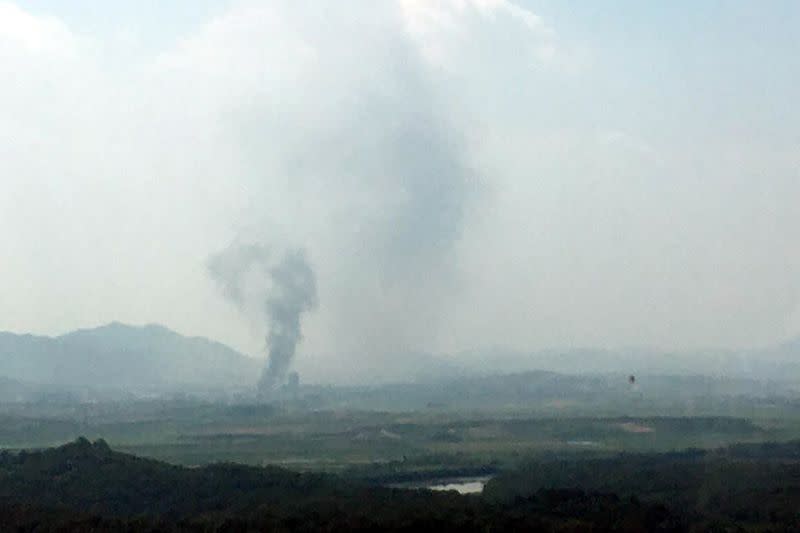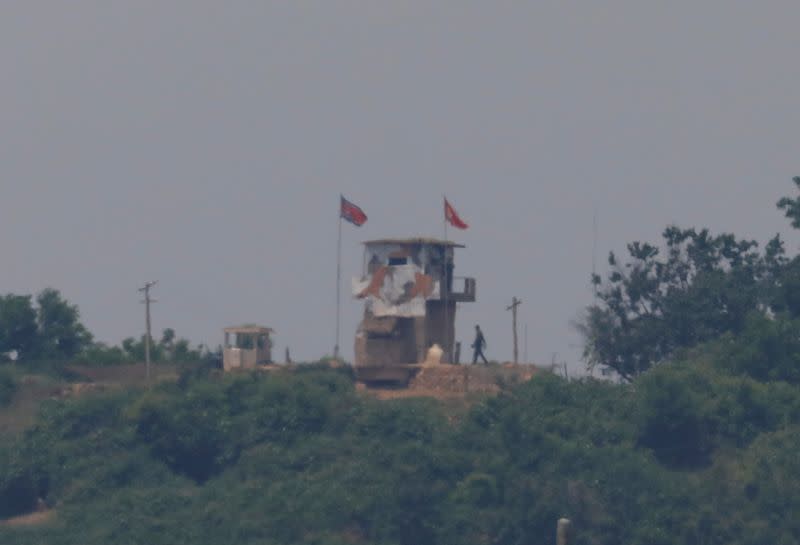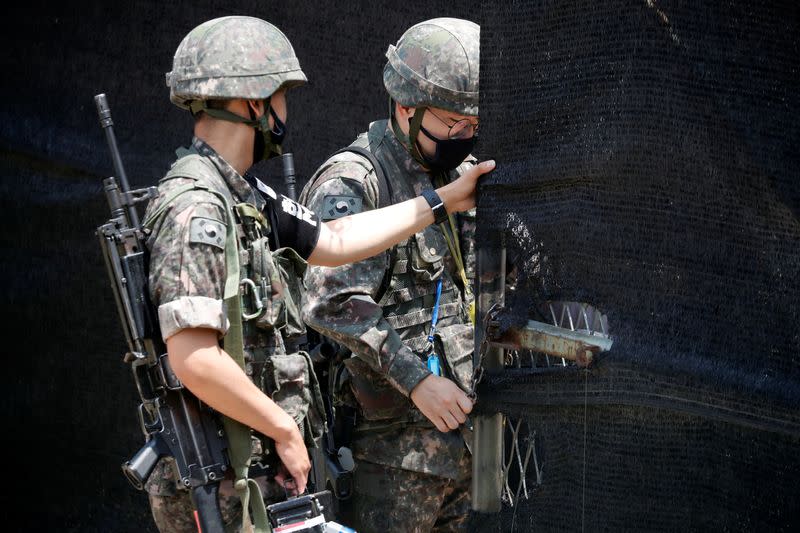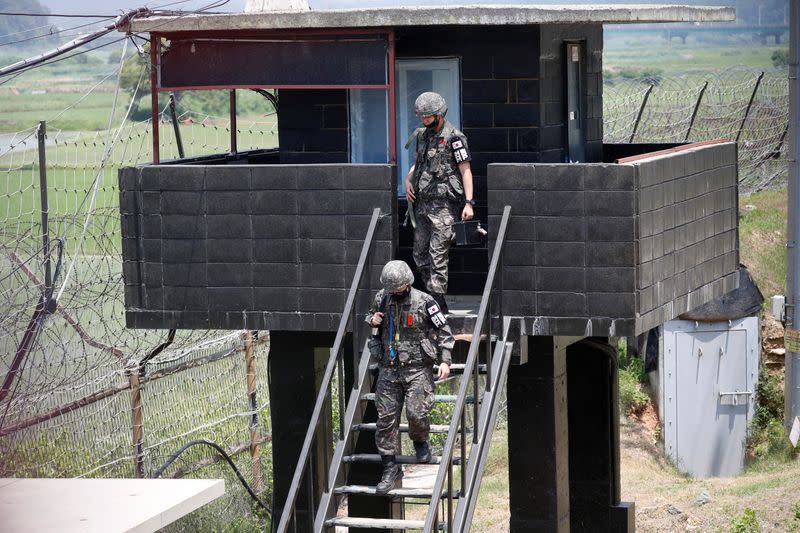North Korea destroys inter-Korean liaison office in 'terrific explosion'
By Hyonhee Shin and Josh Smith
SEOUL (Reuters) - North Korea on Tuesday blew up a joint liaison office set up in a border town in 2018 to foster better ties with South Korea after threatening action if defectors continued with a campaign of sending propaganda leaflets into the reclusive North.
The liaison office in Kaesong - a gleaming blue-glass four-storey structure in an otherwise drab industrial city - was "ruined with a terrific explosion," North Korea's state news agency KCNA said.
Destruction of the building, closed since January due to coronavirus fears, represented a major setback to South Korean President Moon Jae-in's efforts to coax North Korea into cooperation. It also appeared to be a further blow to U.S. President Donald Trump's hopes of persuading North Korea to give up its nuclear weapons and open up to the world.
The U.S. State Department said Washington fully supports Seoul's efforts on inter-Korean relations and urged Pyongyang to "refrain from further counterproductive actions."
North Korea last week warned Washington to refrain from commenting on inter-Korean affairs if it wanted the Nov. 3 U.S. presidential election to go smoothly, raising concerns it could be contemplating a return to nuclear and long-range missile testing.
Trump has hailed Pyongyang's freeze in such testing as a victory in his unprecedented but otherwise fruitless meetings with North Korean leader Kim Jong Un in 2018 and 2019.
The State Department said Deputy Secretary of State Stephen Biegun, the top U.S. official dealing with North Korea, would travel with Secretary of State Mike Pompeo to Hawaii on Tuesday. Sources said Pompeo will met with China's top diplomat Yang Jiechi in Hawaii on Wednesday to discuss issues including North Korea.
China is North Korea's main ally and neighbour and shares U.S. concerns about Pyongyang's weapons programs. U.S. officials have stressed the need for Beijing to strictly enforce international sanctions on North Korea.
Russia expressed concern about the Korea situation, urging restraint from all sides.
Surveillance video from South Korea's defence ministry showed a large explosion that appeared to bring down the office building. It also appeared to cause a partial collapse of a neighbouring 15-storey block that had housed South Korean officials who had staffed the liaison office.
Jenny Town of 38 North, a think tank focusing on North Korea, saw the destruction of the office as part of Pyongyang's efforts to secure sanctions relief and shift attention from domestic hardships worsened by coronavirus containment steps.
Daniel Russel, the top U.S. diplomat for East Asia until early in Trump's administration, added, "Ramping up pressure through escalating provocations is how Kim makes the point that without sanctions relief, sooner or later he will also blow up Trump's claim to have 'ended the threat' from North Korea."
'ACTION PLAN'
The first diplomatic mission of its kind, the liaison office was established in 2018 as part of a series of projects aimed at reducing tensions between the two Koreas.
North Korea's media also quoted its military as saying it had been studying an "action plan" to re-enter zones that had been demilitarized under the 2018 inter-Korean pact and "turn the front line into a fortress".
South Korea's defence ministry urged North Korea to abide by the agreement, under which both sides vowed to cease "all hostile acts" and dismantled a number of structures along the heavily fortified Demilitarized Zone between the countries.
South Korea's national security council said Seoul would respond sternly if North Korea continued to raise tensions.
Deputy national security advisor Kim You-geun said destruction of the Kaesong building "broke the expectations of all people who hope for the development of inter-Korean relations and lasting peace on the peninsula".
South Korean vice unification minister Suh Ho, who co-headed the office, called its demolition "unprecedented in inter-Korean relations" and a "nonsensical act".
Reclusive North Korea and democratic South Korea remain technically at war because their 1950-53 conflict ended in a truce, not a treaty. Tensions have risen in recent days with North Korea threatening to cut ties and retaliate over the propaganda leaflets carrying messages critical of Kim Jong Un.
Referring to defectors, KCNA said the office was blown up to force "human scum and those who have sheltered the scum to pay dearly for their crimes".
Several defector-led groups have regularly sent flyers over the border, together with food, $1 bills, mini radios and USB sticks containing South Korean dramas and news, usually by balloon or in bottles by river.
The Kaesong building was originally used as offices in the Kaesong Industrial Complex, a venture between the two Koreas suspended in 2016 amid disagreement over North Korea's nuclear and missile programmes.
South Korea spent at least 9.78 billion won ($8.6 million) to renovate it in 2018. South Koreans worked on the second floor and North Koreans on the fourth floor. The third floor housed conference rooms for meetings between the two sides.
(Reporting by Hyonhee Shin, Josh Smith, and Sangmi Cha in Seoul; additional reporting by David Brunnstrom and Matt Spetalnick in Washington; Editing by Will Dunham and Alistair Bell)







